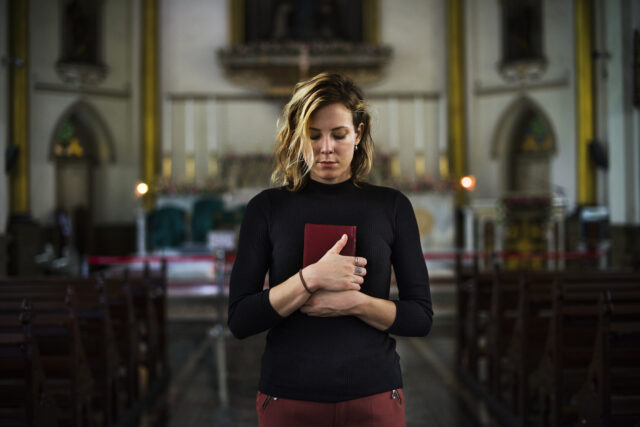The Bible is a source of wisdom and guidance for many.

However, it contains verses that are controversial and up for debate, particularly when it comes to the roles and limitations placed on women. While interpretations vary, certain passages have been used to justify restrictions on women’s behaviour and participation in religious and social life. Here are some of the most eyebrow-raising things the Bible says women can’t do, and their implications.
1. Teach or have authority over men (1 Timothy 2:12)

This verse has been interpreted as banning women from holding positions of religious authority over men or teaching them in a religious setting. It’s an obvious cornerstone of debates about women’s ordination and leadership roles in various denominations. This verse has sparked plenty of heated discussions about the historical context of the Bible and its relevance to modern society.
2. Speak in church (1 Corinthians 14:34-35)
 Source: Unsplash
Source: Unsplash These verses are often cited to silence women in church services, suggesting that their voices shouldn’t be heard in religious organisations. This has led to debates about the role of women in worship and whether their contributions should be limited or encouraged. Some argue that these verses reflect cultural norms of the time, while others believe they hold timeless significance. (Spoiler: Those in the latter camp are misogynists!)
3. Divorce their husbands (1 Corinthians 7:10-11)

While the Bible discusses divorce, it often highlights reconciliation. However, this passage seems to place restrictions on women initiating divorce, claiming that they should remain married even if separated. Yikes! This has fuelled discussions about gender equality within marriage and the right of women to choose to end a relationship.
4. Cut their hair short or shave their heads (1 Corinthians 11:5-6)

This verse has been used to argue against women doing whatever they want with their own hair, especially since long hair has been associated with femininity and modesty for eons. This has led to debates about cultural expectations of beauty and the freedom of women to express themselves through their appearance. Some interpret this passage as a cultural norm of the time, while others believe it holds relevance today.
5. Wear braided hair, gold, or pearls (1 Timothy 2:9-10)

These verses have been used to suggest that women should dress modestly and avoid ostentatious displays of wealth. This has sparked discussions about the definition of modesty, cultural expectations of women’s attire, and the potential for these verses to be used to control women’s bodies and self-expression.
6. Be prophets (1 Corinthians 14:34-35)

While the Bible mentions female prophets like Deborah and Huldah, these verses have been interpreted as discouraging women from publicly prophesying or proclaiming God’s message. This has led to debates about the role of women in religious leadership and whether their voices should be excluded from prophetic roles.
7. Marry more than one man (Polyandry)

While polygamy (a man having multiple wives) is discussed in the Bible, polyandry (a woman having multiple husbands) is not explicitly mentioned. This has been interpreted as implying that polyandry is not permissible for women, raising questions about gender equality in marriage and the right of women to have multiple partners if they choose.
8. Serve as priests (Exodus 28:43; Numbers 18:7)

These verses specify that only men from the tribe of Levi could serve as priests in the Old Testament. This has been used to argue against women’s ordination in some religious traditions, and this exclusion has led to ongoing debates about the role of women in religious leadership and whether their exclusion from the priesthood is justified by scripture or cultural norms.
9. Initiate intimacy in marriage (1 Corinthians 7:4)

This verse suggests that a wife’s body does not belong to her but to her husband, implying that she doesn’t have autonomy over her own desires. This interpretation has rightfully been criticised for its potential to perpetuate harmful power dynamics in relationships and for disregarding a woman’s agency and pleasure in marital intimacy.
10. Remarry if their husbands die (1 Timothy 5:14)

This verse advises younger widows to remarry, bear children, and manage their households, while older widows are encouraged to devote themselves to prayer and good deeds. This has been interpreted as suggesting that a woman’s primary purpose is tied to marriage and motherhood, limiting her options and autonomy after the death of her husband.
11. Be healed of certain “unclean” conditions (Leviticus 12:1-5)

This passage describes rituals of purification for women after childbirth, with longer periods of isolation for giving birth to a daughter than a son. This has been criticised for perpetuating the idea that women’s bodies are inherently unclean and for differentiating between the value of male and female children.
12. Inherit property if they have brothers (Numbers 27:1-11)

While this passage addresses inheritance laws, it initially prioritises male heirs. Only if there are no sons can daughters inherit property. This has been viewed as discriminatory, highlighting historical gender inequalities in property ownership and financial independence.
13. Make vows without their husband’s permission (Numbers 30:3-15)

This verse states that a woman’s vows can be nullified by her father if she’s unmarried or her husband if she’s married. This has been seen as undermining a woman’s ability to make independent decisions and commitments, reinforcing the idea that her autonomy is subject to male authority figures.
14. Testify in court without a male witness (Deuteronomy 19:15)

This passage requires multiple witnesses to establish a legal case, but it seems to imply that a woman’s testimony alone might not be sufficient. This has been interpreted as devaluing women’s voices and credibility in legal matters, raising concerns about gender bias in historical legal systems.
15. Touch the Ark of the Covenant (Numbers 4:15)

This verse specifically instructs the sons of Kohath to handle the Ark of the Covenant, suggesting that women were not allowed to touch this sacred object. This has been seen as excluding women from certain religious rituals and reinforcing the idea of their separation from holy objects and spaces.
16. Eat in the same room as their husbands while on their period (Leviticus 15:19-24)

This passage describes menstruation as a state of ritual impurity and suggests that women should be isolated during this time, a practice which some cultures sadly still follow — Hindus, for instance, still have Chhaupadi, a practise that forces women to live in secluded huts while on their period. Perhaps unsurprisingly, this has been criticised for stigmatising a natural bodily function and perpetuating the idea that women are unclean or impure during their menstrual cycle.
17. Be saved without childbirth (1 Timothy 2:15)

This verse suggests that women will be saved through childbirth, raising questions about the salvation of women who are unable or choose not to have children. As a result, it seems like the Bible was limiting the paths to salvation for women and emphasising motherhood as their primary role and purpose. What if a woman doesn’t want children? What if she can’t have them? This is ridiculous for a number of reasons.
18. Pursue education and careers like men (Titus 2:3-5)

While this passage encourages older women to teach younger women, it emphasises domestic roles like being home-makers and submitting to their husbands. This has been used to argue against women pursuing higher education and careers outside the home, reinforcing traditional gender roles and expectations for women’s lives. Needless to say, it’s incredibly outdated and sexist, and most women would balk at the very idea.




